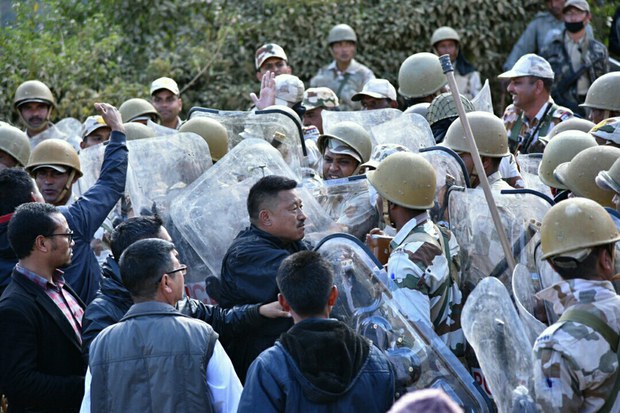India: Tribal Body's Lifting of Blockade Brings Relief to Manipur Residents
2017.03.21
Guwahati, India
 United Naga Council supporters scuffle with security personnel while picketing outside government offices in Senapati, a town in northeast India’s Manipur state, over a plan by local officials to create seven new districts, Jan. 1, 2017.
United Naga Council supporters scuffle with security personnel while picketing outside government offices in Senapati, a town in northeast India’s Manipur state, over a plan by local officials to create seven new districts, Jan. 1, 2017.
Manipur resident Shila Devi is relieved that an influential tribal body has finally lifted a months-long economic blockade in the northeast Indian state.
The United Naga Council (UNC), an apex body that represents more than 35 Naga tribes, had blocked highways leading to Manipur since Oct. 31 to protest a decision by the previous Congress party government to create seven new districts in the state by splitting areas dominated by hill tribes.
The nearly 2.1 million-strong indigenous Nagas, some 625,000 of whom live in Manipur, for decades have opposed any arbitrary bifurcation or division of their land.
On Sunday the council lifted the blockade, which had crippled life in the region and brought about a severe shortage of essential commodities, after the state’s newly formed Bharatiya Janata Party (BJP) government agreed to resolve the issue amicably.
“For the past nearly five months our family has been surviving on just one meal a day in order to preserve our stock of kerosene, which was selling for over three times its actual price in the black market,” Devi, 40, told BenarNews. A large majority of households in rural India use kerosene to light cooking stoves.
Devi is one of about 2.7 million Manipur residents who were affected by the logjam, which resulted in an acute shortage of food, fuel and medicinal supplies as UNC members prevented goods-laden trucks from entering the state.
“We had more or less exhausted our supply of kerosene when we heard the good news. We are thankful to the new BJP government and the UNC for agreeing to resolve the problem without causing further grievance to the common people,” said Devi, who lives in the outskirts of state capital Imphal.
The 139-day impasse resulted in a loss of about 1 billion rupees (U.S. $15.3 million) to the state government, according to the taxation department.
“It’s a huge relief that the blockade has been lifted,” Bomdilla Singh, a grocer in Imphal, told BenarNews.
“Had the logjam continued, I would have been forced to close down my grocery shop for good because all supplies had dried out,” Singh said.
New party in power
The BJP, India’s ruling party that swept to power in Manipur earlier this month, hailed the lifting of the blockade as the “first step to usher in an era of peace and stability as promised by Prime Minister Narendra Modi.”
“Following a meeting with UNC leaders over the weekend, we recognized their grievances and agreed to start consultations with the stakeholders to address them,” Satyendra Singh, joint secretary of the Ministry of Home Affairs, told BenarNews.
The move by the previous state government to create new districts was a conspiracy to snatch away land owned by members of the Naga tribe, according to the UNC.
“During the talks held recently, BJP officials conceded that Naga groups were not consulted by the previous government before it announced the creation of the new districts. The move was in violation of earlier agreements signed with the Indian government,” S. Milan, UNC’s general secretary, told BenarNews.
“We were satisfied with the BJP government’s assurance and hence decided to call off our agitation,” Milan said, adding that the government had also agreed to the unconditional release all UNC members who were arrested during the near five-month deadlock.
The opposing Congress party accused the BJP of timing its intervention on the issue strategically to win votes in the recently concluded state assembly elections.
“For months, we had been requesting intervention from New Delhi to help lift the blockade. But our requests were ignored,” Okram Ibobi, Manipur’s previous chief minister, told BenarNews.
“Just days after forming the government in the state, the BJP managed to broker peace with the UNC. How is that possible? It is amply clear that the BJP wanted to use the blockade as a poll issue,” Ibobi said.







